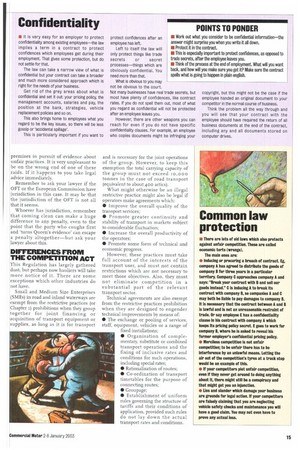Confidentiality
Page 15

If you've noticed an error in this article please click here to report it so we can fix it.
• It is very easy for an employer to protect confidentiality among existing employees—the law implies a term in a contract to protect confidences which employees get during their employment That gives some protection, but do not settle for that.
The law can take a narrow view of what is confidential but your contract can take a broader and much more considered approach which is right for the needs of your business.
Get rid of the grey areas about what is confidential and set it out: your pricing policy, the management accounts, salaries and pay, the position at the bank, strategies, vehicle replacement policies and so on.
This also brings home to employees what you regard to be the key issues, so there will be less gossip or 'accidental spillage'.
This is particularly important if you want to protect confidences after an employee has left.
Left to itself the law will only protect things like trade secrets or secret processes—things which are obviously confidential. You need more than that.
What is obvious to you may not be obvious to the court.
Not many businesses have real trade secrets, but most have plenty of confidences, like contract rates. If you do not spell them out, most of what you regard as confidential will not be protected after an employee leaves you.
However, there are other weapons you can reach for even if you do not have specific confidentiality clauses. For example, an employee who copies documents might be infringing your copyright, but this might not be the case if the employee handed an original document to your competitor in the normal course of business.
Think the problem all the way through and you will see that your contract with the employee should have required the return of all business documents at the end of the contract, including any and all documents stored an computer drives.
































































































































